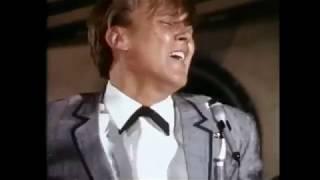"Shangri-La" is a popular song written by Carl Sigman (lyricist), bandleader Matty Malneck, and Robert Maxwell in 1946. The term comes from "Shangri-La," the hidden valley of delight in James Hilton's 1933 novel "Lost Horizon." The term "Shangri-La," especially in the 1930s and 1940s, was slang for heaven or paradise, and the song is about the joy of being in love. The Four Freshmen is a multiple (six) Grammy-nominated American male vocal band quartet that blends open-harmony jazz arrangements with the big band vocal group sounds of The Modernaires (Glenn Miller), The Pied Pipers (Tommy Dorsey), and The Mel-Tones (Artie Shaw), founded in the barbershop tradition. The Four Freshmen is considered a vocal band because the singers accompany themselves on guitar, trumpet, bass, and drums, among other instrumental configurations.
The Four Freshmen is an American male vocal band quartet that blends open-harmonic jazz arrangements with the big band vocal group sounds of The Modernaires (Glenn Miller), The Pied Pipers (Tommy Dorsey), and The Mel-Tones (Artie Shaw), founded in the barbershop tradition. The Four Freshmen is considered a vocal band because the singers accompany themselves on guitar, horns, bass, and drums, among other instrumental configurations.
In early 1948, brothers Ross and Don Barbour, then at Butler University's Arthur Jordan Conservatory in Indianapolis, Indiana, formed a barbershop quartet called Hal's Harmonizers. The Harmonizers also included Marvin Pruitt — soon replaced by Ross and Don's cousin Bob Flanigan — and Hal Kratzsch (1925--70), replaced in 1953 by Ken Errair. The quartet soon adopted a more jazz-oriented repertoire and renamed itself the Toppers. At first, they were influenced by Glenn Miller's The Modernaires and Mel Tormé's Mel-Tones, but soon developed their own style of improvised vocal harmony. In September 1948, the quartet went on the road as The Four Freshmen, and soon drew the admiration of jazz legends such as Dizzy Gillespie and Woody Herman.
In 1950, The Four Freshmen got a break when band leader Stan Kenton heard the quartet in Dayton, Ohio, and arranged for an audition with his label, Capitol Records, which signed The Four later that year. In 1952, they released their first hit single "It's a Blue World". Further hits included "Mood Indigo" in 1954, "Day by Day" in 1955, and "Graduation Day" in 1956.
Throughout the 1950s and early 1960s, The Four Freshmen released a number of recordings, made film and television appearances, and performed in concert. The group eventually lost their mainstream following with the advent of the British pop bands of the 1960s. The group did not disband, however, even after the last original member, Bob Flanigan, retired in 1993. After his retirement Flanigan managed the group and owned the rights to The Four Freshmen name. He died on May 15, 2011 at the age of 84 from congestive heart failure. Ross Barbour died on August 20, 2011 from cancer at the age of 82.
During its 65-year history, The Four Freshmen had twenty-three different line-ups and twenty-four different members. The 2013 Four Freshmen lineup of Brian Eichenberger (lead, bass, arranger), Stein Malvey (second voice, guitar), Curtis Calderon (third voice, trumpet, flugelhorn), and Bob Ferreira (fourth voice, drummer, soloist) was first established in 2013. They perform at upwards of 100 bookings a year. The Four Freshmen have been honored with the following designations: JazzTimes magazine's Readers Poll Best Vocal Group (multiple wins), Down Beat magazine's Readers Poll Best Vocal Group (multiple wins), and Down Beat magazine's Readers Poll Hall of Fame finals (multiple years).
Your kisses take me to Shangri-La
Each kiss is magic that makes my little world a Shangri-La
A land of bluebirds and fountains and nothing to do
But cling to an angel that looks like you
And when you hold me, how warm you are
Be mine, my darling, and spend your life with me in Shangri-La
For anywhere you are is Shangri-La
Your kisses take me to Shangri-La
Each kiss is magic that makes my little world a Shangri-La
A land of bluebirds and fountains and nothing to do
But cling to an angel that looks like you
And when you hold me, how warm you are
Be mine, my darling, and spend your life with me in Shangri-La
For anywhere you are is Shangri-La
The Four Freshmen is an American male vocal band quartet that blends open-harmonic jazz arrangements with the big band vocal group sounds of The Modernaires (Glenn Miller), The Pied Pipers (Tommy Dorsey), and The Mel-Tones (Artie Shaw), founded in the barbershop tradition. The Four Freshmen is considered a vocal band because the singers accompany themselves on guitar, horns, bass, and drums, among other instrumental configurations.
In early 1948, brothers Ross and Don Barbour, then at Butler University's Arthur Jordan Conservatory in Indianapolis, Indiana, formed a barbershop quartet called Hal's Harmonizers. The Harmonizers also included Marvin Pruitt — soon replaced by Ross and Don's cousin Bob Flanigan — and Hal Kratzsch (1925--70), replaced in 1953 by Ken Errair. The quartet soon adopted a more jazz-oriented repertoire and renamed itself the Toppers. At first, they were influenced by Glenn Miller's The Modernaires and Mel Tormé's Mel-Tones, but soon developed their own style of improvised vocal harmony. In September 1948, the quartet went on the road as The Four Freshmen, and soon drew the admiration of jazz legends such as Dizzy Gillespie and Woody Herman.
In 1950, The Four Freshmen got a break when band leader Stan Kenton heard the quartet in Dayton, Ohio, and arranged for an audition with his label, Capitol Records, which signed The Four later that year. In 1952, they released their first hit single "It's a Blue World". Further hits included "Mood Indigo" in 1954, "Day by Day" in 1955, and "Graduation Day" in 1956.
Throughout the 1950s and early 1960s, The Four Freshmen released a number of recordings, made film and television appearances, and performed in concert. The group eventually lost their mainstream following with the advent of the British pop bands of the 1960s. The group did not disband, however, even after the last original member, Bob Flanigan, retired in 1993. After his retirement Flanigan managed the group and owned the rights to The Four Freshmen name. He died on May 15, 2011 at the age of 84 from congestive heart failure. Ross Barbour died on August 20, 2011 from cancer at the age of 82.
During its 65-year history, The Four Freshmen had twenty-three different line-ups and twenty-four different members. The 2013 Four Freshmen lineup of Brian Eichenberger (lead, bass, arranger), Stein Malvey (second voice, guitar), Curtis Calderon (third voice, trumpet, flugelhorn), and Bob Ferreira (fourth voice, drummer, soloist) was first established in 2013. They perform at upwards of 100 bookings a year. The Four Freshmen have been honored with the following designations: JazzTimes magazine's Readers Poll Best Vocal Group (multiple wins), Down Beat magazine's Readers Poll Best Vocal Group (multiple wins), and Down Beat magazine's Readers Poll Hall of Fame finals (multiple years).
Your kisses take me to Shangri-La
Each kiss is magic that makes my little world a Shangri-La
A land of bluebirds and fountains and nothing to do
But cling to an angel that looks like you
And when you hold me, how warm you are
Be mine, my darling, and spend your life with me in Shangri-La
For anywhere you are is Shangri-La
Your kisses take me to Shangri-La
Each kiss is magic that makes my little world a Shangri-La
A land of bluebirds and fountains and nothing to do
But cling to an angel that looks like you
And when you hold me, how warm you are
Be mine, my darling, and spend your life with me in Shangri-La
For anywhere you are is Shangri-La
- Category
- Jazz
Sign in or sign up to post comments.
Be the first to comment


